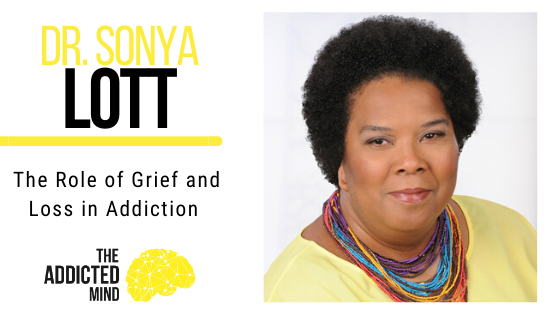Today’s guest is Dr. Sonya Lott, a licensed psychologist with advanced training from Columbia University’s Center for Complicated Grief. Sonya runs a private practice in Pennsylvania and she hosts the Reflections on Multicultural Competence Podcast. She is the founder and CEO of Cempsych LLC, a company offering continuing education for licensed mental health professionals.
Today, Sonya talks to us about grief and loss, which is intertwined in many ways with the addictive process. She explains that living is about connection but, ironically, the more loss we experience, the greater the likelihood becomes that we will actually fear connection. Still, it is very important to acknowledge the need for connection.
Sonya explains that what we think and feel has a direct and immediate influence on what’s happening with the neurotransmitters in our brain. This has a long-term impact on the way that hormones are released in the body. Over time, these reactions become chronic and cyclical, and they have an impact on every part of the body, including the immune system, making us more susceptible to illnesses.
Processing loss is important and we need to grieve to do it. Many people, however, don’t frame their adverse experiences in terms of loss, even though their bodies and their hearts take it in as such. Often, people end up being diagnosed with depression or anxiety without having addressed the root cause, which is usually a painful loss of connection or secure attachment from their early childhood. It’s important to frame any kind of loss and grieve for it because that awareness allows people to heal in a different and deeper way. This is crucial to the recovery process and it lessens the suffering.
Losing a child is particularly challenging for parents because it goes against the natural order of things. Losing a child to an addiction is a bit like losing a loved one to suicide. It comes with a great sense of helplessness, so this type of loss could easily set someone up for complicated grief.
Therapists who are well-informed about grief and addiction can be very helpful for finding meaning in life and establishing a new identity in terms of recovery from addiction. Self-help groups or groups like AA (Alcoholics Anonymous) and NA (Narcotics Anonymous) also provide support for individuals who are able to recognize their experiences of loss.
Links and resources:

